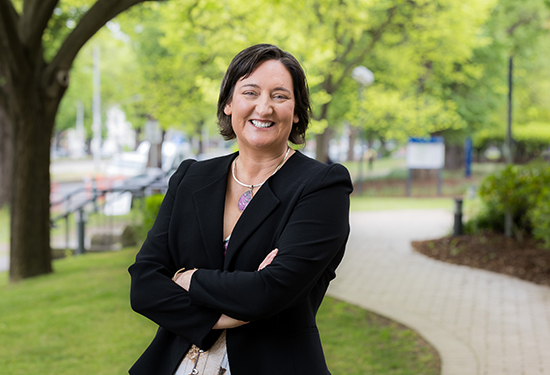
An advocate for patient-centred care and creator of the longest running study of women’s health in Australia, Professor Cassandra Szoeke (BM, BS(GradEntry) ’99) has spent her career influencing policy and guidelines to improve healthy ageing, advancing knowledge through publishing hundreds of medical papers and nurturing the next generation of clinicians.
After completing her undergraduate degree at the University of Melbourne, with honours in Genetics, Professor Szoeke was part of the first postgraduate medical course in Australia, taught at the Flinders Medical Centre.
“Adelaide is so connected to all of the regional centres, so we were traversing the whole of suburban Adelaide out to Port Pirie, Port Augusta, Alice Springs and Darwin,” says Professor Szoeke.
“It helped build independence and provided a varied experience – you get a much larger responsibility and workload, so we really built our skillset.”
As part of this new model of postgraduate Medicine, a strong connection with Indigenous health was introduced, which takes a person-centred approach. Although common practice today, in the 90s care predominantly revolved around disease-based models.
“The best skill I learned in medicine was that connection comes before healthcare can be delivered,” says Professor Szoeke.
“And that’s not just a First Nations thing, it actually works for everyone, but they gave me that skill and the gift of storytelling in medicine.”
Beginning life as the Women’s Healthy Ageing Project in 1990, Professor Szoeke’s study examines the health of Australian women from midlife (then aged 45-55 years) before the menopausal transition and into ageing. The study now has almost 30 years of data on mood, dietary intake, risky behaviours, physical activity and social connectedness among other factors. The program team continue to follow up these 500 women, who are now all aged over 70 years.
A second study, AgeHAPPY, commenced in 2020 open to everyone 18 years old and over, which has resulted in 20,000 participants logging their lifestyles and health habits online. Together, these studies form the Healthy Ageing Program.
“We now understand that the chronic diseases of ageing like heart disease, stroke, dementia, and more actually started 30 years before they manifest,” says Professor Szoeke.
“So short-term research projects just aren’t capturing the data we need.”
The long running study, which has elevated Professor Szoeke to expert status of Alzheimer’s Disease and Medicine, shows no signs of slowing down, with the children of the original participants now joining as of 2021.
“We’re combining our data with massive government databases to identify healthcare utilisation,” says Professor Szoeke.
“If we can spot early changes in data, it means we can say to the government, ‘Look, I know they’re not depressed yet, but they’re seeing the GP more often and showing other red flags, we should help these people now.’ It’s better to get in early and prevent.”
Professor Szoeke has been involved in the establishment and steering committees of several major Australian collaborative studies, sat on the executive scientific board of the Australian Imaging Biomarker and Lifestyle study of ageing (AIBL), and was Inaugural Chair of its Vascular Stream.
In the broader community, she is involved with several STEM mentorship programs through CSIRO, Quantum Australia and Women in Science. She wrote her first lay-person book Secrets of Women’s Healthy Ageing in 2021, which became the best-selling title in the genre of Medicine in Melbourne University’s 100-year publishing history.
“My greatest achievement is supporting the amazing volunteers who contribute to research by sharing their stories,” says Professor Szoeke.
“It’s challenging some of the things we get them to do in our study, like four hours of neuro-psych evaluations, but they give their time for free to benefit the health of other people.”
Rising through the ranks as a professor at a time when young females in the medical profession were rarely seen, Professor Szoeke has remained a force to be reckoned with, reminding herself of the sacrifices her refugee parents and grandparents made to call Australia home.
“Any challenge that I could face pales in comparison to what I know they went through to give me the opportunity to be here facing this challenge, and I really think their example makes the hurdles that I face seem easily surmountable, therefore building my resilience,” says Professor Szoeke.
Professor Cassandra Szoeke was awarded a 2023 Distinguished Alumni Award for her distinguished leadership in dementia, women’s health research, and the influence of policy and guidelines internationally to improve healthy ageing.

